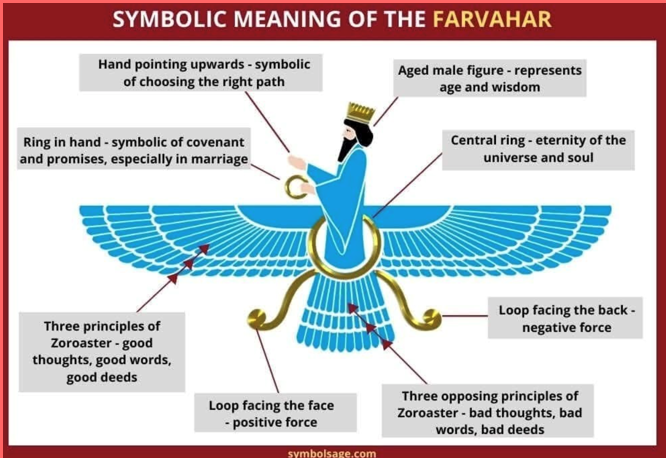Zoroastrianism
1/36
There's no tags or description
Looks like no tags are added yet.
Name | Mastery | Learn | Test | Matching | Spaced | Call with Kai |
|---|
No analytics yet
Send a link to your students to track their progress
37 Terms
Persian empire (Iran but probably actually closer to the Indian subcontinent)
Where did Zoroastrianism originate from?
., Ātash Bahrām, Ātash Ādarān, Ātash Dādgāh
What are the different grades of fire?
Identify and explain the significance of Ātash Bahrām
the highest, purest form of fire requiring 16 different sources, 9 priests to assemble, lots of ritual around it. “Fire of Victory”
Identify and explain the significance of Ātash Ādarān
“Fire of fires”. Fire from 4 different sources.
A fire from a household hearth
A fire from a tradesman’s forge (for heating metals)
A fire from a king’s palace or government building
A fire from a priest’s hearth
Identify and discuss the significance of Ātash Dādgāh
“Fire of the household” for domestic worship, anyone can do it, but typically under priestly guidance.
Who was Ahura Mazda?
Transates to “wise lord”
main god (zoroastrianism is monotheistic)
Ahura Mazda engenders/produces two Spirits:
Aingra Minyu (evil) and Spenta Minyu (holy)
Aingra Mainyu created what?
Death
Cosmic history in Zoroastrianism
Creation
Mixture
Separation
Identify and explain rituals surrounding death in Zoroastrianism
Towers of Silence, dispose of the body quickly,
What risk does a man impose on himself if he were to carry a corpse by himself?
the Nasu (corpse-demon) defiles him and he is unclean forever
important city
Yazd (in Iran)
Symbolic meaning of the Farhavar
what is the meaning tho?

motto
“good thoughts, good words, good deeds”
Persian name of Zoroaster?
Zarathushtra
Who was Zoroaster?
originator of Zoroastrianism (c. 8th century BCE)
True/False: Zoroastrianism was historically a minority religion
true
True/false: Zoroastrianism was popular in Iran
True
Name a prayer
Ashem Volu
What were the three pre-islamic Iranian dynasties?
Three pre-Islamic Iranian dynasties:
Achaemenids (c. 550-330 BCE)
Parthians (c. 247 BCE-224 CE)
Sasanians (224-651 CE)
significance of Sasanians
- Modern Zoroastrianism
- Avesta is gathered
What is the name of the earliest and most sacred text?
The Avesta (comes from the Old Persian word upastavaka, meaning “praise”)
Identify and discuss the significance of fire
purity, unity, warmth
Atash Dadgah (fire of the household)- home, for prayers
Atash Adaran (fire of fires) – fire from four places under priest guidance
Atash Bahram (fire of victory)- highest grade of fire, collected from 16 sources of fire, 9 priests working together to make it
What is another name for a Zoroastrian priest?
a magos (p. magoi)
What is humata, hukhta, hvarshta ?
“Good thoughts, good words, good deeds”
creed/motto
reflects the concern for ethics within Zoroastrian faith
What is Zoroastrianism called in Iran?
Mazdayasna (“the worship of Ahura Mazda”)
a Zoroastrian is a “Mazdaist”
Who was Angra Mainyu?
“Evil Spirit” prereq to Satan (but diff bc they worked together)
Responsible for the creation of death
Angra Mainyu and Spenta Mainyu significance
twin spirits of Ahura Mazda
able to choose their own path
good and evil lies within all of us: choice
What are the demons called and how do they come to exist?
Daevas: pondered choice for too long and angra mainyu made them evil
lesser divine beings:
6
amesha spentas (holy immortals)
Yazatas “Beings worthy of worship” (these are ancient gods and goddesses of the pre-
Zoroastrian pantheon)
Creation story
Ahura Mazda made it in 2 stages
Menog (spiritual, immaterial)
Getig (material and more important but also where evil starts)
Bundahism first human: “Gayo-maretan”
What happens after death?
Chinvat Bridge (bridge of the seperator)
leads to either heaven (heavenly abode, imperfect, eternal happiness only comes at the end), hell (dwelling of the worst purpose, long age of misery, darkness, bad food) or limbo
End of Time?
Eschaton
Saoshyant
Made aware, ppl on earth stop eating, righteous and wicked are divided, heaven and hell (physical punishment + looking at heaven) for 3 days, river of metal everyone goes in (warm milk for righteous), all souls are rendered immortal, Ahura Mazda vs big evil (Angra Mainyu?), purification and reward, wicked are purified but then all are allowed into heaven
Disposal of the body (early)?
- Early: bodies eaten by birds of prey, scavengers
- No cremation because that would sully the fire and don’t touch the dead
Towers of Silence?
Dakhma
o A place for vultures to dismember corpses
o 70’s was banned in Iran, but Parsis in India can still practice this
males, female, children w a pit in the middle to put the bones (where they can or once they?) disintegrate. Mix bones w rocks, sand, underground. When a tower fills up, a new one can be built, acid poured over remaining bones
importance of corpse
Corpses have no importance (and it is impure), the soul is the important part, once someone has died, their soul is gone so their body isn’t important.
once the body is done it should be dealt with asap (someone dies in the morning, put the body in the tower of silence that afternoon)
No fussing with the body, don’t waste resources on the body, don’t preserve the body
modern corpse disposal
, small community of Zoroastrianism, modern times cremation and donating body to science.